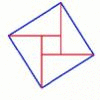Skip over navigation



Or search by topic
Number and algebra
Geometry and measure
Probability and statistics
Working mathematically
Advanced mathematics
For younger learners
Hypotenuse Lattice Points
Age 14 to 16
Challenge Level 





|
The triangle OMN has vertices on the axes with whole number
co-ordinates.
Points which have whole number coordinates are called lattice
points.
How many lattice points are there on the hypotenuse MN?
|
 |
You may also like
Just Opposite
A and C are the opposite vertices of a square ABCD, and have coordinates (a,b) and (c,d), respectively. What are the coordinates of the vertices B and D? What is the area of the square?
Ladder and Cube
A 1 metre cube has one face on the ground and one face against a wall. A 4 metre ladder leans against the wall and just touches the cube. How high is the top of the ladder above the ground?
Beelines
Is there a relationship between the coordinates of the endpoints of a line and the number of grid squares it crosses?

